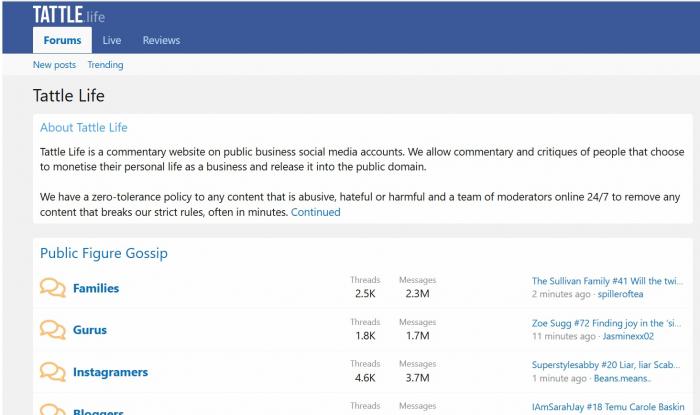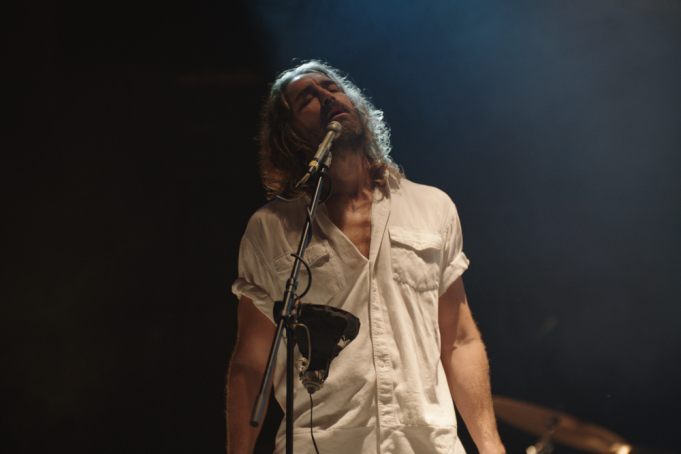
Is This the End of Tattle Life, One of the Most Hated Sites on the Internet?
By Kayleigh Donaldson | Miscellaneous | June 16, 2025

Last week, two entrepreneurs and influencers were awarded £300,000 in libel damages after they sued the website Tattle Life. Neil and Donna Sands sued the site over posts made about them in 2021, which they claimed were part of a wider campaign of harassment and invasion of privacy that the website was largely responsible for. The case also revealed the suspected operator of the site to be Sebastian Bond, an influencer himself who has used numerous pseudonyms, including female ones. A series of freezing orders for more than £1 million were made while a forensic investigation was carried out worldwide to identify the defendant’s assets. Sebastian Bond has companies registered in both the UK and Hong Kong.
Tattle Life has long struck fear into the hearts of influencers, particularly those who are based in Britain. Even by the standards of toxic online spaces and internet harassment, they were especially cruel. Tattle Life billed itself as a place for “commentary and critiques of people that choose to monetise their personal life as a business and release it into the public domain.” That largely seemed to take the form of misogyny, transphobia, smears, and doxxing. While the site claims to have a “zero-tolerance policy to any content that is abusive, hateful, or harmful”, it’s not hard to find threads full of deeply invasive and bullying discourse. The New Statesman declared Tattle Life to be “the most toxic place on the internet.” Doxxing is shockingly commonplace.
A 2021 piece by The Guardian talked to several people who were targeted by the site. One influencer even gave evidence before a parliamentary committee, calling for the site to be taken down. Many targets of Tattle Life talk about the trauma of being bullied by these users, who often attack their families and children, make questionable claims about their parenting, and claim they’re lying about matters like mental health and postnatal depression. It’s spiralled into real-world harassment, with many reporting hate comments on their social media accounts and some losing work because Tattle Life users sabotage planned business deals. As Katie Haynes told The Guardian, Tattle users called the police on her repeatedly and accused her of drinking when she was pregnant. “I thought social services were going to take my baby off me,” she says. “I had to ring the local authority for advice on what to do. If it wasn’t for me being pregnant, I wouldn’t be here today. I was suicidal.”
One of Tattle Life’s claims is that it’s a free-thinking, free-speech first site dedicated to accountability for those who have chosen to make their private lives their brand. They see themselves as journalistic figures with a duty to dissect the influencers who are eking out a few quid from sponcons about mattresses and video tours of their bathrooms. Mocking influencers is the easiest sport online, and it’s certainly a Wild West space where a lot of suspect behaviour was allowed to flourish for too long before the law caught up to changing media ways. As someone who frequently writes about this area of celebrity myself, I know what a weird and tricky job it is to make sense of something like a YouTuber you’ve probably never heard of, but is still a very big deal. In that sense, Tattle Life is like a lot of sites, from Mumsnet to many a Reddit.
But people weren’t disgusted at Tattle Life for ‘holding influencers accountable.’ They weren’t mad at some snark or bad-taste jokes. They were against outright slander, doxxing, and online stalking in the name of altruism. The furious rigour applied to destroying the lives and careers of the most anodyne individuals is near-impossible to justify. Who truly benefits from spinning these narratives that often contain accusations as serious as child abuse and predatory behaviour? What is the purpose of publishing the private details of someone’s off-camera family, friends, or colleagues?
We are not a society that has much empathy for, well, anyone, but particularly celebrities. I’ve been writing about them professionally for over eight years now, and even the most earnest and well-researched article on a highly serious matter will inevitably inspire a few comments about how it doesn’t matter because they’re rich, famous, and ‘asked for this.’ By embracing the difficult, emotionally draining Catch-22 experience of being famous, however major or minor the levels you reach are, you have become 100 percent fair game to a certain contingent of bullies. As definitions of fame change, bringing into it internet celebrities and influencers, that cruelty seems to increase tenfold. Such figures are considered undeserving of ‘true’ fame but justified in receiving all of the downsides. Expect to be threatened, doxxed, harassed, and libelled, even if you don’t have the money or industry support structures to withstand it.
Look, everyone enjoys hating. Have you read some of my articles? Ragging on celebrities can be a fun, low-stakes activity you do in between important stuff. It can feel cathartic, like laughing at Katy Perry’s girlboss space flight or Elon Musk’s flopsweat attempts at gaming. But surely we’re all aware of which lines shouldn’t be crossed? ‘I don’t like that actress’s dress’ is such a world away from ‘here’s this person’s home address so we can call the cops on her and claim she’s abusing her kids.’ That shouldn’t even need to be explained. But in spaces like Tattle Life, A always equals Z, and everything is acceptable if you cloak it in the sheen of accountability.
I think Tattle Life’s popularity and its effectiveness in scaring so many people reveal an uncomfortable truth about this sort of harassment: that the people doing it love having the power to hurt others. They may disguise it as ‘accountability’ (boy, that word has long lost its meaning in these circumstances, right?) but that doesn’t distract from the sheer pleasure they take in committing so many hours of their precious life to making sure an influencer with 50k followers is afraid to sleep at night.
If Tattle Life were to close, it wouldn’t end the hate, of course. They’d migrate elsewhere, perhaps to an even more rotten cesspool where people can find opportunities to sink even lower. But it does matter to see a site designed for purposes of hate and profit be forced to confront the fact that consequences do exist for all. Online harassment is so depressingly common in every corner of the internet that it almost doesn’t register to us anymore. We’ve been trained to view it as a weary inevitability, something that can never be fixed or challenged. That’s always been patently false, even if it feels like the only ones who can do something about it are those with the money to fund a lengthy lawsuit. But hell, I’ll take this victory against Tattle Life. It can’t hurt to remind these losers now and then that they don’t rule the world.


